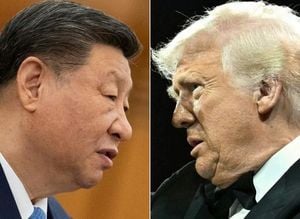In a significant move to address economic challenges stemming from international pressures, Taiwan's Executive Yuan has approved a special budget regulation amounting to 410 billion NTD. This decision, made on April 24, 2025, is aimed at bolstering economic and social resilience as well as enhancing national land security, but it has sparked considerable debate among opposition parties.
Premier Cho Jung-tai has committed to personally visiting each political party caucus on April 28, 2025, to clarify the details of the special budget and garner support for its swift passage. He emphasized the importance of understanding the budget's contents, particularly in light of the criticisms it has received from various opposition factions.
The special regulation includes a notable allocation of 100 billion NTD to Taipower, Taiwan's state-owned electric utility, which has faced scrutiny from the opposition. Critics argue that the substantial funding to Taipower, which aims to stabilize electricity prices, could be seen as a revival of previously cut budgets. However, Cho has defended this allocation by stating that the financial support is crucial for maintaining stable commodity prices and preventing any further increases in electricity costs.
During a media briefing, Cho explained that the decision to allocate 100 billion NTD to Taipower is a direct response to the industry's request to avoid additional electricity price hikes this year. He noted, "The industry hopes that there will be no further electricity price increases this year, and if Taipower can receive this injection of funds, it will help stabilize electricity prices during the review by the Electricity Price Review Committee."
President Lai Ching-te has also urged the opposition to consider the necessity of this funding, appealing to them to use resources wisely and support Taipower's operations without raising electricity prices. The Democratic Progressive Party (DPP) believes that the resources from the special regulation will be effectively utilized to support livelihoods, industries, and national development.
Despite these assurances, both the Kuomintang (KMT) and the Taiwan People's Party (TPP) have expressed their opposition to the subsidy for Taipower. The KMT has reiterated its stance that cash should be distributed directly to citizens instead. KMT legislator Wayne Chiang stated, "In addition to deducting labor and health insurance, there is still enough surplus to distribute 10,000 NTD per person; the 100 billion NTD for Taipower is open for discussion unless a promise is made to use nuclear power."
In addition to the allocation for Taipower, the special budget also includes 20 billion NTD earmarked for the health insurance fund. Shih Chung-liang, Director-General of the National Health Insurance Administration, explained that this funding will prioritize addressing unexpected risks and ensuring a stable supply of medications, thereby protecting the public's right to access necessary medical care.
The special regulation, formally titled the "Special Regulations for Strengthening Economic and Social Resilience and National Land Security in Response to International Situations," is designed to provide financial support to enterprises, enhance industrial competitiveness, and subsidize labor and health insurance. This comprehensive approach aims to address the economic impacts of the ongoing tariff war initiated by the United States.
In response to the escalating trade tensions, the Executive Yuan had previously approved a separate support plan of 88 billion NTD to assist export supply chains affected by U.S. tariffs. However, following consultations with industry stakeholders, this amount has now been increased to 93 billion NTD, focusing on subsidies for industrial upgrades and transformations.
Cho emphasized that the government had already laid out plans for the budget surplus prior to the tariff crisis, indicating that the allocation of funds is not merely a reaction to current events but part of a broader strategy to enhance national resilience. He stated, "The scope of this special regulation is broad, covering the response to international situations and strengthening economic, social, and national land resilience."
As the Legislative Yuan prepares for a general interpellation on the special regulations, Cho is set to address the opposition's concerns regarding the budget's allocation methods and the decision not to distribute cash directly to the public. He hopes to clarify that the special budget encompasses a wide range of initiatives aimed at supporting vulnerable groups and stabilizing prices.
In the coming days, as Cho meets with party caucuses, the focus will be on ensuring that all parties understand the importance of these allocations in the context of Taiwan's economic stability. The success of this initiative could hinge on the government's ability to effectively communicate its objectives and the anticipated benefits of the special budget.
In summary, the passage of this special budget regulation is pivotal for Taiwan as it seeks to navigate the complexities of international trade pressures while ensuring the stability of essential services like electricity and healthcare. The outcome of the discussions in the Legislative Yuan will be closely watched as stakeholders from various sectors weigh in on the proposed allocations.




